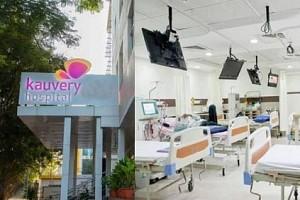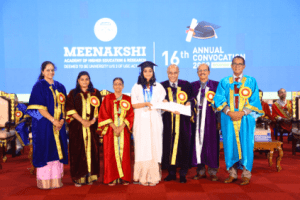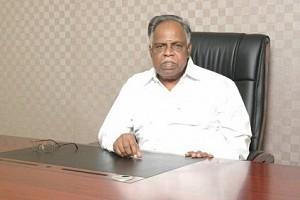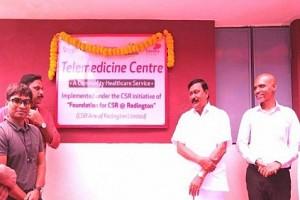KAUVERY HOSPITAL PERFORMS A MARATHON RADIO FREQUENCY ABLATION PROCEDURE ON THE HEART, TO SAVE A 42-YRS OLD WITH VENTRICULAR TACHYCARDIA
Home > News Shots > Tamil NaduChennai, 9th February 2023: Ventricular tachycardia is a heart rhythm abnormality, also known as arrhythmia. It originates because of electrical short circuits in the ventricles of the heart, and are rapidly conducted. Patients with ventricular tachycardia usually present with palpitations, giddiness, seizures or even cardiac arrest.

Kauvery Hospital Chennai, a unit of Kauvery Group of Hospitals, a leading multispecialty healthcare chain in Tamil Nadu, successfully performed a six-hour-long, minimally invasive Cardiac Electrophysiology intervention procedure, to correct a potentially fatal acute heart rhythm problem, of genetic origin, in a forty-two-year-old. IT professional. He was received at the emergency with palpitations and giddiness; ECG showed ventricular tachycardia (VT). It was reverted with multiple electric shocks (defibrillation).
In ventricular tachycardia, the heartbeat is abnormally fast, typically 200 or more beats per minute. A fast heartbeat makes it difficult for the heart to pump blood and maintain circulation. If this occurs, the individual would develop shortness of breath, dizziness, or even lose consciousness. A sustained ventricular tachycardia can degrade to ventricular fibrillation, an even faster and chaotic rhythm, leading to sudden cardiac arrest.
An emergency response team of ER physicians, Cardiologists and anesthesiologists at Kauvery hospital administered electric shocks. The cardiac electrophysiologists promptly conducted Electrophysiology (EP) studies, and performed a cardiac intervention procedure called Radio-Frequency Ablation (RFA) to normalize the patient’s heart rhythm. They also implanted an Intra Cardiac Defibrillator (ICD) to prevent and treat possible any recurrence in future of the arrhythmia.
Explaining the procedure, Dr. Deep Chandh Raja S, Clinical Lead Cardiac Electrophysiologist- Kauvery Hospital, who performed a 6-hour-long procedure on the patient, said, “The 42-year-old was suffering from Familial Arrhythmogenic Right Ventricular Dysplasia (ARVD), which is a Cardiomyopathy of genetic origin. In this condition, the muscle gets altered, developing short circuits in the heart’s electrical conducting system This patient was fortunate to reach the hospital with repeated episodes of Ventricular Tachycardia. We took him for a complex procedure called “Endo-Epicardial Radiofrequency Ablation (RFA)”. In this procedure, we removed the short circuits from both the heart's inner and outer surfaces, with a minimally invasive approach, at the Hybrid Cath Lab. Also, we used advanced equipment like a 3D Navigation system and contact force catheters. The patient was off the ventilator the same day. The patient also received the implant of a Defibrillator (ICD) on Day 7. His heart rhythm has since been normal, and he is free from episodes of VT. I thank the entire team of cath lab technicians and doctors for supporting the patient during the entire arduous procedure”. Dr Sundar C, the treating Senior cardiologist added that the patient was identified with the condition with the help of Cardiac MRI. One of the patient’s family members had suffered death at an early age presumably due to the same condition and a hence genetic testing was also done on this patient. He reiterated that such procedures are possible only with support from cardiac anesthetists and back-up from cardiac surgeons. The cardiac anesthetic team was headed by Dr P Chandrasekhar.
Speaking on the success of the procedure, Dr. Aravindan Selvaraj, Co-Founder and Executive Director of Kauvery Hospital Chennai, said, “Familial cardiomyopathy is a condition that begins from birth, but symptoms may develop only in adulthood. This is also one of the primary causes of sudden cardiac arrests among young and middle-aged adults. The patient had a family history of Cardiomyopathy, and had lost his brother at the age of 25. It is crucial not to ignore such symptoms, seek cardiological advice and get the right intervention. This patient had presented very ill, to the Emergency (ER) department. We were racing against time. The ER team did a tremendous job in saving the life of the patient. I appreciate Dr Sundar C, Dr Deep Chandh Raja S and the entire team for their accurate diagnosis, technical expertise and excellent management, using the latest technologies and the state-of-art infrastructure available at our facility, thus saving his life.”
The patient is now back in his hometown, has resumed work and is being closely monitored.











